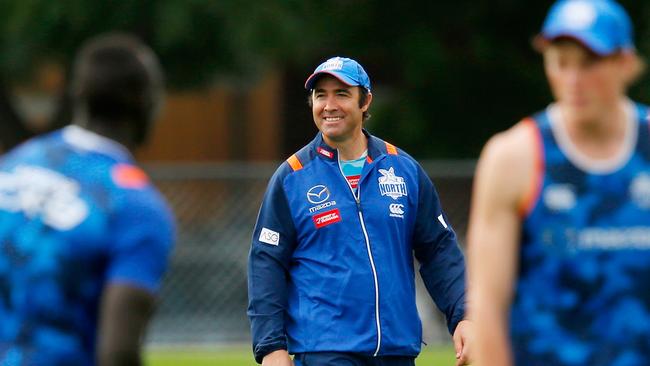Brad Scott says the game is as good as ever
An AFL coach tasked with ensuring the game’s welfare has urged critics to do their research before commenting on the state of the game.

One of two AFL coaches tasked with ensuring the competition’s welfare has urged critics to do their research before commenting on the state of the game.
North Melbourne coach Brad Scott, who was appointed to the inaugural competition committee, is adamant the standards and skill levels of the game have improved significantly over the years.
Scott’s comments come amid criticism the game has become too congested and that skills have declined, which correlates with evidence scores have dropped and goalkicking accuracy has diminished.
Scott, who will be joined on the 12-person committee by Brisbane coach Chris Fagan, said it would be a topic of conversation at a meeting next Thursday but that he was far from concerned about the way football was being played.
“We will meet pretty soon and talk through all those things but, rather flippantly, I think you pull out the same story most years, about the state of the game,” he said.
“I would prefer to take a much broader look at the game over a period of decades and I would very, very confidently say that the game has got better, not worse.
“There will always be the doomsayers who bemoan how good football used to be. Well, get out your VHS tape and have a look at how good it used to be, because it is nothing like it is now.
“I think we go week-to-week on these things. I think the game is in a pretty good state. Can it be better? There are questions we have to ask.”
His twin brother Chris, who coaches Geelong, has suggested one possible solution would be to reduce the number of players on the field from 18 to 16 if congestion is a concern. But he does not believe there is any need for drastic change.
“Having a debate about how we can improve our great game, as long as it doesn’t give the impression that it’s in dire straits because clearly it’s not … then talking about it is a positive,” he said. “I do bristle at the notion that our great game is in a horrible position. For the most part, that’s older people looking at in the past through rose-coloured glasses.”
Collingwood coach Nathan Buckley said one alteration that could reduce congestion around the football was the rule related to prior opportunity.
Buckley said that if a decent tackle laid on a player in possession results in an illegal disposal or an inability to clear the football, they should be penalised regardless of whether they had time to get rid of it.
This, he said, would reduce the number of handballs issued to players nearby under pressure and would instead lead to more kicking to clear the congestion.
“Tactics would change because you wouldn’t get as many handballs in tight, and if you don’t get as many handballs in tight, then you’re less likely to commit your numbers in tight,” Buckley said on SEN. “You’re more likely to commit your numbers to other parts of the ground.”
Four-time premiership coach Alastair Clarkson, when discussing a contentious bump his player Ryan Burton delivered to North Melbourne’s Shaun Higgins in round five, stressed a similar point.
He urged umpires to penalise players who incorrectly disposed of the football, regardless of whether they had been given reasonable time to pass it on.
“We are treating the game as if we are playing a group of under-12s and they don’t know how to kick, mark or handball,” he said. “Pay the free kick”
Scott, whose Kangaroos meet Sydney on Saturday night at the SCG, was reluctant to discuss this suggestion given his role on the AFL’s competition committee.
But his viewpoint differed from that of Buckley and Clarkson in regards to prior opportunity. “I do, but I am reluctant to go into too much detail, because that is something that needs to be put on the table with the committee,” he said.
“What I will say is that football has and always will start in a contest and the player who makes the ball his objective and hunts the ball first should be given protection in terms of high contact, holding the man, all those sorts of things.
“My view pretty simply is that if he is making the ball his objective, it is pretty harsh to pin him when he hasn’t had opportunity to distribute the ball.
“To me, the game should always protect the ballplayer.”



To join the conversation, please log in. Don't have an account? Register
Join the conversation, you are commenting as Logout